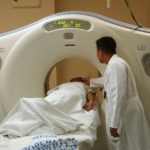One of the non-IPF causes of pulmonary fibrosis is chronic hypersensitivity pneumonitis. This disease is probably more common than we think. Patients have symptoms of cough and shortness of breath. The disease is slowly progressive for the most part, though there is a form that is more dramatic with fevers and rapidly progressive symptoms. Causes of Hypersensitivity … [Read more...]
Tips for Dealing with IPF Pain
When you think of symptoms of idiopathic pulmonary fibrosis, shortness of breath, coughing, and fatigue may come to mind. But some people with pulmonary fibrosis also experience chronic or frequent pain. Although pain is not considered one of the main symptoms of IPF, it can develop. Although there is limited scientific research on pain with IPF, it is possible it can occur … [Read more...]
Pulmonary Fibrosis That is Not Idiopathic
Although IPF gets most of the attention, the other causes of Pulmonary Fibrosis are more common. It is particularly important to diagnose IPF correctly as it is treated very differently from the other causes of Pulmonary Fibrosis. Pulmonary Fibrosis May be Broadly Divided into 3 Groups. Idiopathic: The diagnostic criteria are well described and include a typical pattern … [Read more...]
Coughing Up Blood – Hemoptysis
Patients with lung disease can experience many scary things, including feeling short of breath, inability to cough up phlegm, chest pain and lightheadedness. Another less common symptom is coughing up blood. The medical term for this is hemoptysis. Coughing up blood can be a particularly alarming experience. Usually it is painless. Your doctor will ask if the blood is … [Read more...]
Pulmonary Fibrosis Lung Disease That’s Not IPF
Idiopathic Pulmonary Fibrosis is one of many lung diseases that leave scar or fibrosis in the lungs. Patients with IPF generally are older than 50 years of age and don’t have a connective tissue disease such as rheumatoid arthritis or lupus or other diseases associated with scarring in the lungs. The high resolution CT scans show lower lobe predominant … [Read more...]




